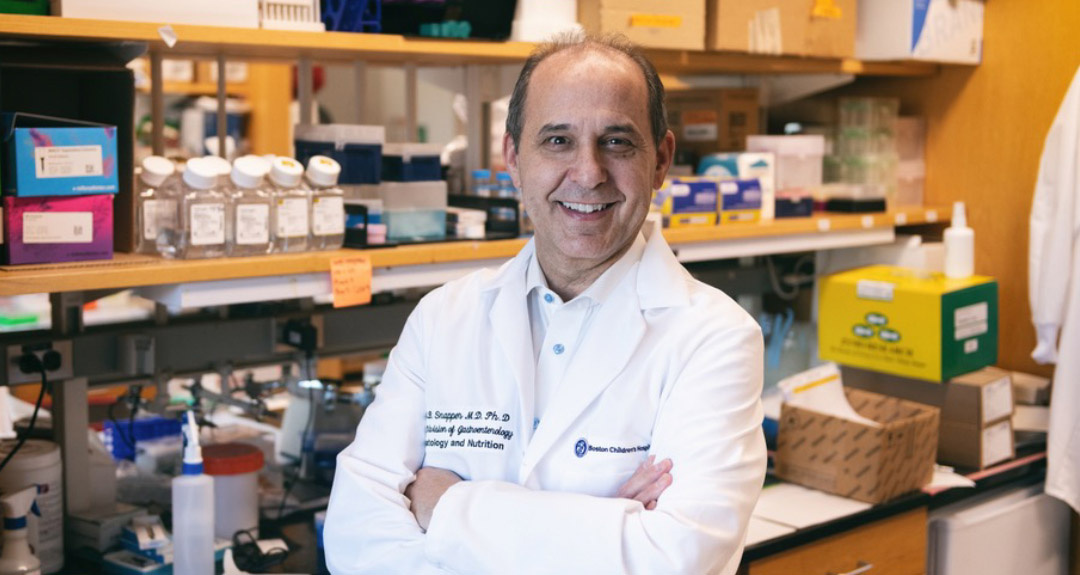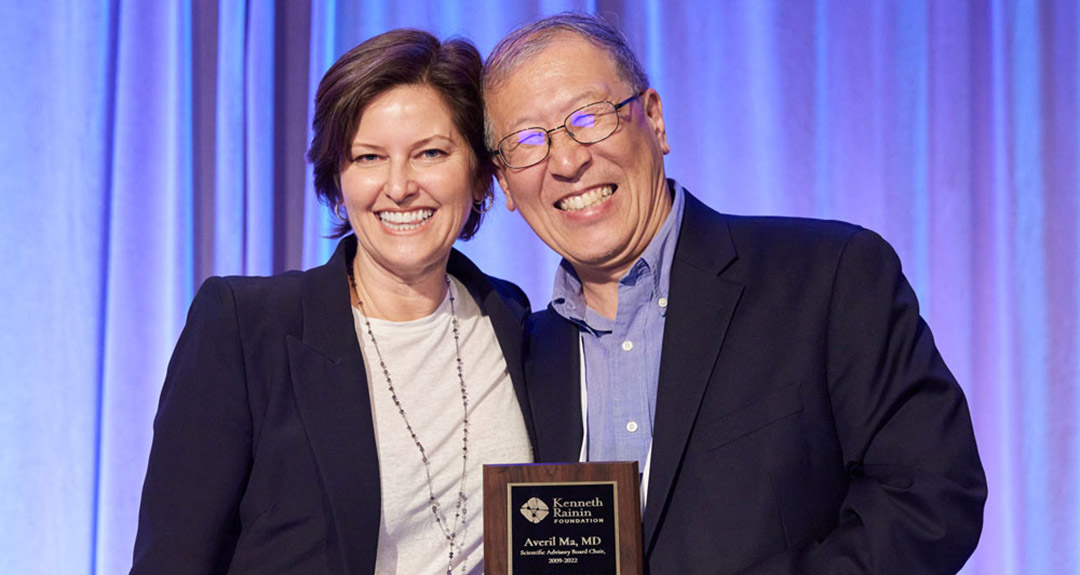
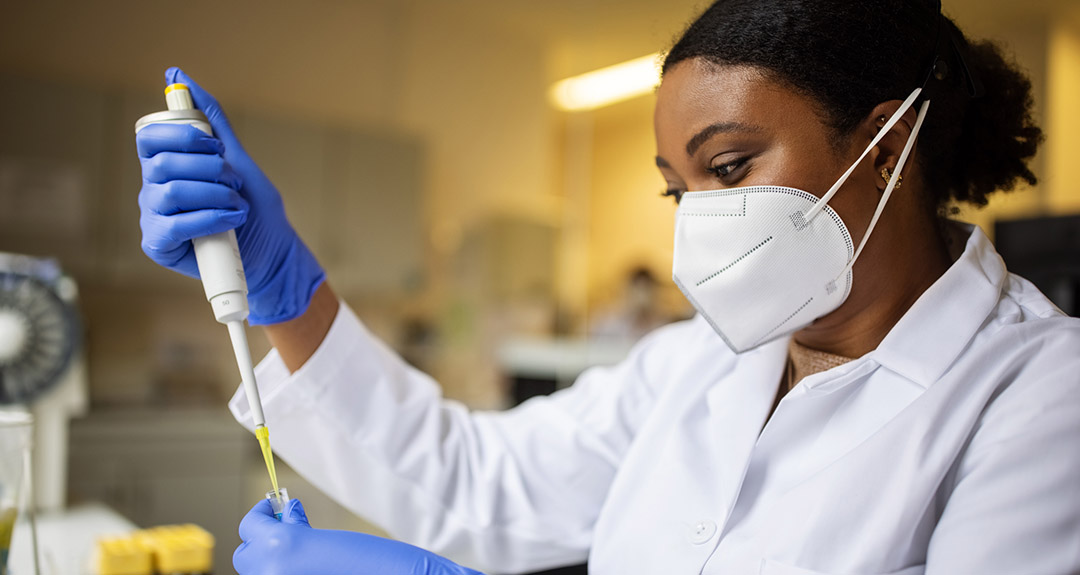
Photo credit: Luis Alvarez, Getty Images
The Kenneth Rainin Foundation provides early support for novel ideas across a range of fields that could lead to advancements in preventing and treating IBD.
Advancing Novel Research Insights
The Kenneth Rainin Foundation envisions a world where no one suffers from Inflammatory Bowel Disease (IBD). In 2023, our grantees’ novel insights and cutting-edge technologies advanced the understanding and treatment of these diseases. Their innovations are identifying new targets for therapeutics and helping to speed the development of new drugs for those living with IBD. Throughout the year, we remained focused on advancing equity in our practices and promoting greater diversity in the field to improve outcomes for patients.
“At the heart of our commitment to finding a cure for IBD is a focus on advancing novel research, fostering collaborations and embracing diverse perspectives.”
—Shelley Trott, Chief Program Officer

Photo credit: Fly View Productions, Getty Images
Diverse perspectives are crucial to advancing science and improving outcomes for patients.
Addressing Disparities In Research And Healthcare
The lack of racial representation in healthcare and biomedical research negatively affects patients of color. Over the past few years, we have been building relationships with historically underrepresented researchers and research institutions to advance meaningful change. This work introduced us to two recently established organizations—led by and for people of color—that are at the forefront of addressing disparities for researchers, clinicians and patients of color.
The Association for Black Gastroenterologists and Hepatologists (ABGH) promotes health equity in Black communities, advances science and develops the careers of Black clinicians and scientists. Our funding supported organizational capacity building and ABGH Rising, a new mentorship program that offers educational and career development workshops and pairs Black clinicians with Black medical students and trainees.
Color of Gastrointestinal Illnesses promotes research, education and advocacy to improve the quality of life for people of color living with IBD and other chronic illnesses. Our grant funded communications and programming for patient education and awareness during IBD Awareness Week, in collaboration with ABGH. These investments reflect our commitment to improving patient outcomes, and to funding the people and ideas driving long-lasting change.
“Supporting the next generation of gastroenterologists through mentorship is invaluable, and the impact is readily evident as our participants become more competitive applicants and see themselves reflected through our leadership.”
—Sophie Balzora, MD, FACG, President and Co-Founder, The Association of Black Gastroenterologists and Hepatologists (ABGH)
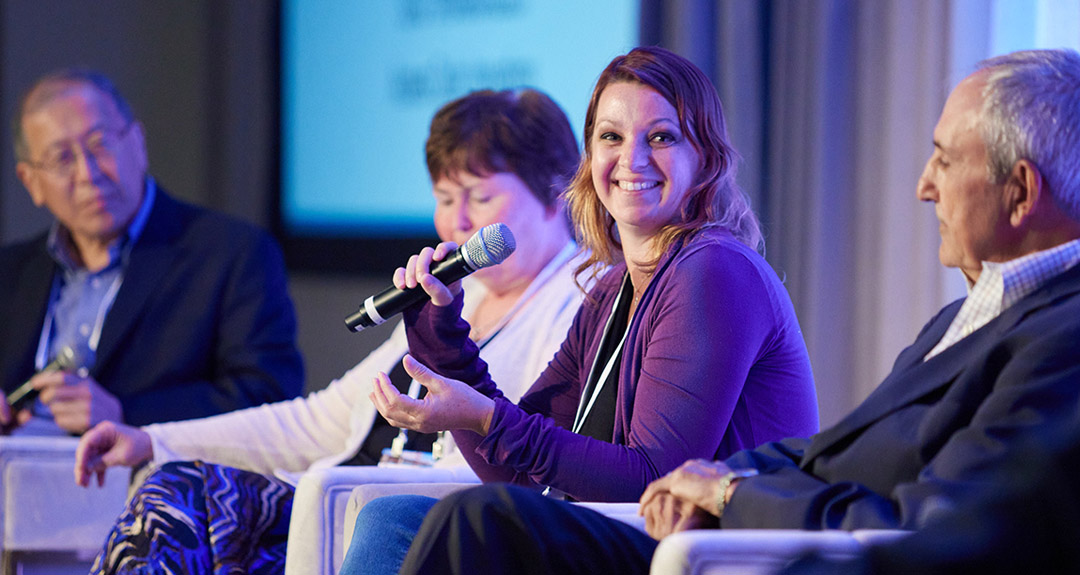
Photo credit: Mitch Tobias
Immunologist Dr. Meghan Koch discusses her lab’s research on maternal-fetal interactions during the Innovations Symposium.
Understanding Immunity And Inflammation
Our early funding for innovative ideas is leading to improvements in preventing, diagnosing and treating IBD. Grantees are unlocking new therapeutic targets by exploring unique aspects of the complex relationship between immunity and inflammation in health and disease.
- At her University of Massachusetts lab, Kate Fitzgerald, PhD, studies a long non-coding RNA (lncRNA) that maintains tissue homeostasis and restrains inflammation in healthy and functional tissue. In patients with ulcerative colitis however, the levels of this lncRNA decrease. Her results suggest opportunities to restore tissue health by controlling those levels.
- Brigitta Stockinger, PhD, and co-investigator James Lee, MD, PhD, teamed up at the Francis Crick Institute. Dr. Stockinger’s work in immunology and inflammation examines the interplay between genes and environmental factors like diet. Their collaboration focuses on a gene called AHR, which is both an important sensor of dietary compounds and an IBD risk factor.
“Rainin Foundation grantees are leading innovative research and collaborating across disciplines to advance the understanding of this complex disease.”
—Laura Wilson, PhD, Director, Health Strategy & Ventures
BRINGING SCIENCE CLOSER TO THE PATIENT
Photo courtesy of Scott Snapper.
The Foundation’s Scientific Advisory Board ensures a variety of perspectives and experiences guide our funding recommendations and strategies toward curing IBD. As the Board’s Co-Chair, Dr. Snapper represents our priority of bringing science closer to the patient.
Harnessing Interactions In The Microbiome
Many of our 2023 Innovator Award grantees seek to harness metabolic interactions in the microbiome as promising avenues for new treatments. The field’s increased focus on metabolites is leading to greater momentum in drug development and clinical testing. Momentum matters to patients.
- At Harvard T. H. Chan School of Public Health, Wendy Garrett, MD, PhD, and co-investigator Curtis Huttenhower, PhD, are researching how a class of bacterial metabolites called fatty acid amides affect resistance and susceptibility to IBD.
- Manuela Raffatellu, MD, at University of California, San Diego, is investigating how beneficial and harmful bacteria influence the generation of antibodies by B cells under healthy and ulcerative colitis conditions.
- Andreas Bäumler, PhD, at University of California, Davis, is examining whether sorbitol, a sugar substitute, exacerbates colitis by increasing osmotic stress and triggering colonic inflammation.
“This funding will help my lab to understand new ways by which beneficial and harmful bacteria interact with B cells in the gut, which could have important implications for future treatment of IBD.”
—Manuela Raffatellu, MD, University of California, San Diego
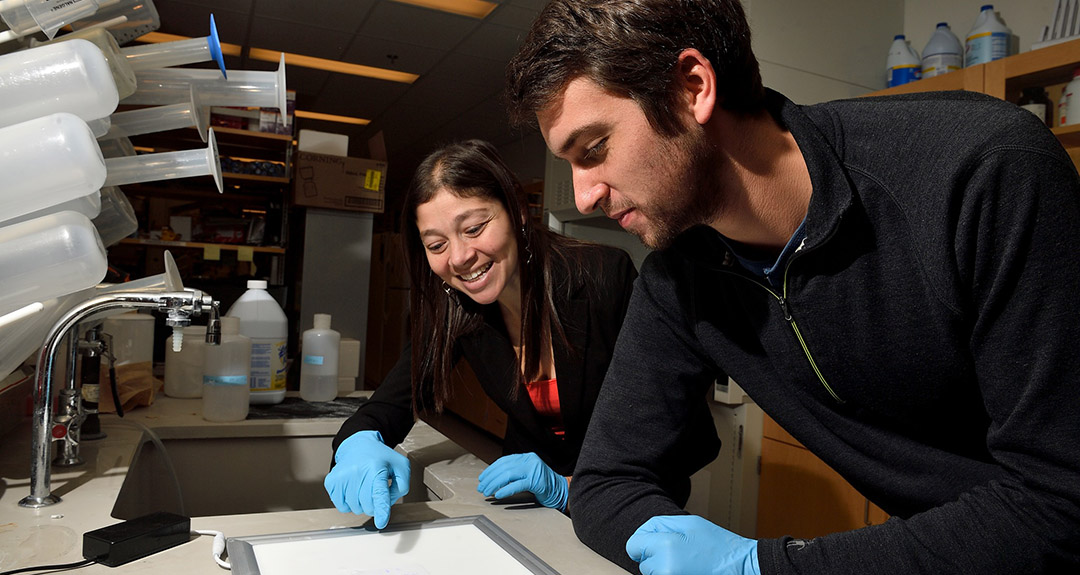
Photo courtesy of Johns Hopkins Biomedical Engineering.
Dr. Jamie Spangler (left) uses innovative technologies in her lab to inform drug development.
Leveraging Advanced Technologies
Grantees are also leveraging advanced technologies and analytical methods in IBD research. Projects relate to regulating immune response, preventing disease progression and deciphering IBD’s predictive factors.
- At his University of Pittsburgh lab, Timothy Hand, PhD, developed a rapid and flexible method for measuring the microbial products in IBD patients. It provides more useful data about outputs than current methods during an acute IBD flare and identifies what genes are being expressed by each. To demonstrate its efficacy, they will measure the number and toxin expression of Clostridiodes difficile, a common bacterium in IBD patients.
- Using cutting-edge technologies with her lab at Johns Hopkins University, Jamie Spangler, PhD, has engineered a cytokine-antibody fusion protein. It leverages the potential for the interleukin-2 protein to mitigate autoimmune diseases, including IBD, without stimulating other factors that drive inflammation and lead to disease progression. Their project advances studies in animal models and patient samples to lay the groundwork for clinical trials.
- At the Icahn School of Medicine at Mount Sinai, Francesca Petralia, PhD, teamed up with Jean-Frédéric Colombel, MD, and Zeynep Gumus, PhD. Drawing on Dr. Petralia’s work developing new statistical methods, the collaboration will examine the molecular underpinnings of IBD’s preclinical period using the predictive power of machine-learning based models. By integrating massive multi-omic data sets from a large study of samples from the US Department of Defense Serum repository, they hope to identify primary factors that initiate and advance IBD development.
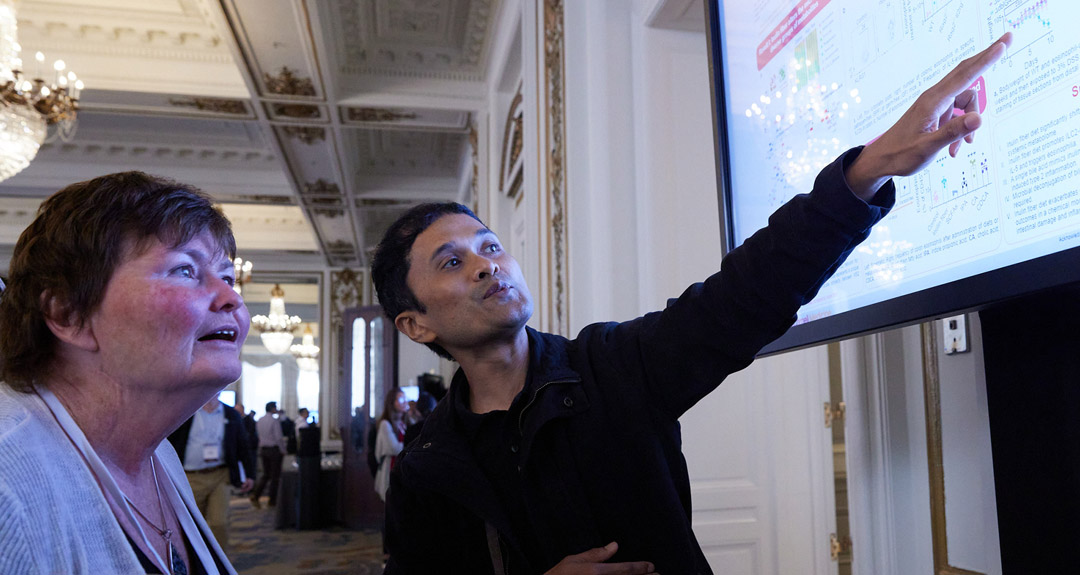
Photo credit: Mitch Tobias
Dr. Fiona Powrie learns about Dr. Mohammad Arifuzzaman’s research during the Innovations Symposium’s poster sessions.
Rejuvenating Our In-Person Symposium
In July, an energized group of researchers and clinicians attended the Rainin Foundation’s first in-person Innovations Symposium since 2019. Speakers ranged from seasoned investigators to early- and mid-career innovators across various fields. Their presentations included the microbiome’s role in maintaining homeostasis and contributing to inflammation, intriguing immunological connections to skin bacteria and the effect of circadian rhythms.
Our Innovations Symposium is a key strategy in our work to support early-career scientists. This event is designed to provide these investigators with opportunities to network and learn from leaders in the field. More than one-third of attendees were graduate students and postdocs, many of whom presented posters and benefited from our travel awards. In keeping with our long tradition of investing in the researcher pipeline, this year we doubled the number of those travel awards due to a record number of abstract submissions.
“It was incredibly rewarding to share space in person again at the Innovations Symposium, and to combine outstanding presentations and panel discussions with ample time for networking and exchanging ideas one-on-one.”
—Laura Wilson, Director, Health Strategy & Ventures
CELEBRATING A MILESTONE
Photo credit: Mitch Tobias
Averil Ma, MD, has been a scientific advisor to the Rainin Foundation for nearly two decades. At our Innovations Symposium, CEO Jen Rainin, PhD, celebrated his legacy of insight, guidance and unwavering advocacy for early stage research and translational science.
Collaborating To Advance Science And Equity
“It’s important to go into every grant application as an open slate and leave our biases behind and have scholarly debate among the reviewers. And something that I feel strongly about is identifying a diverse talent pool outside of the standard white male bias.”
—Dr. Scott Snapper, Rainin Foundation Scientific Advisory Board Co-Chair as quoted in our blog “Meet Scott Snapper.”
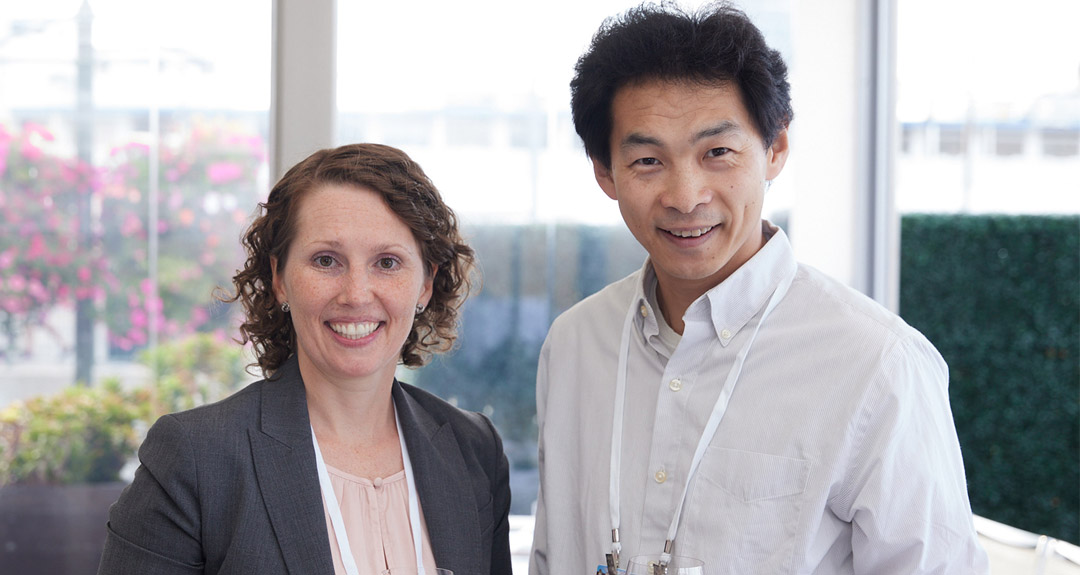
Photo credit: Mitch Tobias
Grantees Dr. Carrie Lucas, Yale University, and Dr. Xu Zhou, Boston Children’s Hospital, at our Innovations Symposium.
Fueling Advances In IBD Research:
2023 Grantees
The Rainin Foundation invested over $5.4 million in 2023 to support IBD research.
Health grantmaking supports groundbreaking ideas that have the potential to dramatically transform the prediction and prevention of Inflammatory Bowel Disease.
Note: Financials are subject to audit verification.
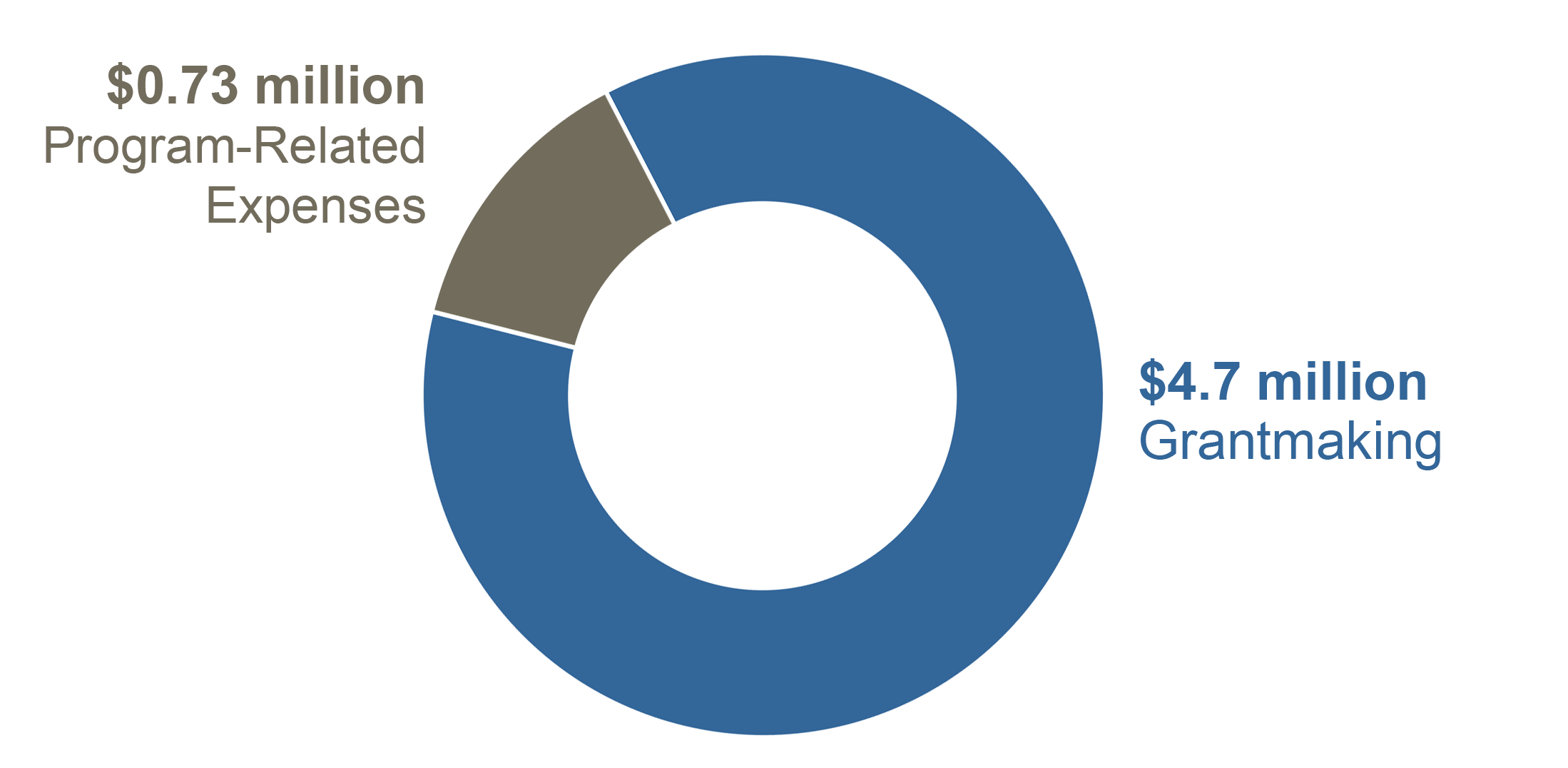
INNOVATOR AWARDS
Grants support an international pool of early-career and seasoned researchers to study untested ideas that could lead to breakthrough discoveries about IBD. Learn more about the 2023 Innovator Award grantees.
- Ziad Al Nabhani, PhD, Universität Bern, and Bart Deplancke, PhD, Swiss Federal Institute of Technology (EPFL)
- Andreas Baumler, PhD, and Jee-Yon Lee, MD, PhD, University of California, Davis
- Lee Denson, MD; Michael Helmrath, MD; and James Wells, PhD, Cincinnati Children’s Hospital Medical Center
- Eran Elinav, MD, PhD, German Cancer Research Center and Weizmann Institute of Science
- Kate Fitzgerald, PhD, University of Massachusetts
- Wendy Garrett, MD, PhD, and Curtis Huttenhower, PhD, Harvard T. H. Chan School of Public Health
- Timothy Hand, PhD, University of Pittsburgh
- Reinhard Hinterleitner, PhD, and Jishnu Das, PhD, University of Pittsburgh
- Michael Kattah, MD, PhD, University of California, San Francisco
- Dale Lee, MD, and David Suskind, MD, Seattle Children’s Hospital; Lindsey Albenberg, MD, The Children’s Hospital of Philadelphia; and Anthony Otley, MD, Dalhousie University
- Phillip Messersmith, PhD, University of California, Berkeley
- James Murphy, PhD; Britt Christensen, PhD; Andre Samson, PhD; and Aysha Al-Ani, Walter and Eliza Hall Institute of Medical Research
- Manuela Raffatellu, MD, University of California, San Diego
- Jamie Spangler, PhD, Johns Hopkins University
- Brigitta Stockinger, PhD, and James Lee, MD, PhD, Francis Crick Institute
- Christoph Thaiss, PhD, University of Pennsylvania
- Omer Yilmaz, MD, PhD, Massachusetts Institute of Technology (MIT), and John LaCava, PhD, University Medical Center Groningen
INNOVATOR AWARDS – CONTINUED SUPPORT
Grants support an international pool of early-career and seasoned researchers to study untested ideas that could lead to breakthrough discoveries about IBD. Research teams who demonstrate significant progress toward their original goals are eligible for up to two years of additional support. Learn more about the 2023 Innovator Award grantees.
- Adebowale (Wale) Bamidele, PhD, Mayo Clinic
- Gregory Barton, PhD, University of California, Berkeley
- Isaac Chiu, PhD, Harvard University
- Marcos Colonna, MD, Washington University in St. Louis
- Greg Fairn, PhD, Dalhousie University
- Garth Swanson, MD, MS, Rush University Medical Center
- Andrew Goodman, PhD, Yale School of Medicin
- Chun-Jun Guo, PhD, Weill Cornell Medicine
- Ruaidhrí Jackson, PhD, Harvard University
- Carrie Lucas, PhD, Yale School of Medicine
- Eric Martens, PhD, University of Michigan
- David Montrose, PhD, Stony Brook University
- Roni Nowarski, PhD, Brigham and Women’s Hospital
- Francesca Petralia, PhD, Mount Sinai
- Eran Segal, PhD, Weizmann Institute of Science
- Anna Katharina (Katja) Simon, PhD, University of Oxford
- Xu Zhou, PhD, Boston Children’s Hospital
COMPLEMENTARY GRANTMAKING
This invitation-only grant supports bold ideas that have the potential to lead to scientific breakthroughs for researchers and people living with Inflammatory Bowel Disease (IBD).
- Azora Therapeutics
- Color of Gastrointestinal Illness
RESPONSE FUND
This discretionary fund supports exceptional and emerging opportunities that will have an outsized impact and move us closer toward our vision of no one suffering from Inflammatory Bowel Disease, Bay Area artists thriving and all Oakland children reading at or above grade level.
- Association of Black Gastroenterologists
Explore the Foundation’s website to learn more about our Health program and meet our staff and Board members.

